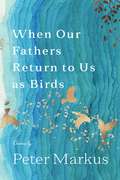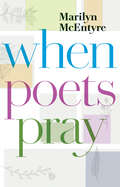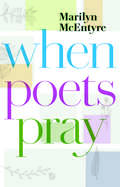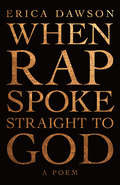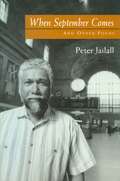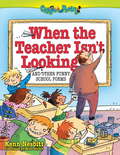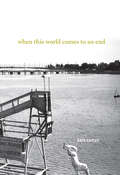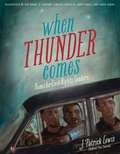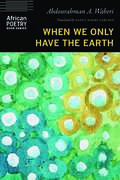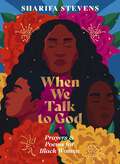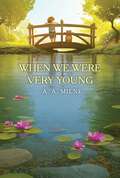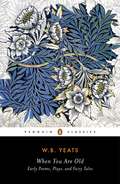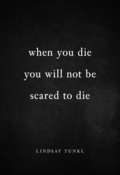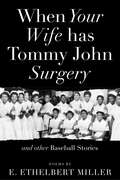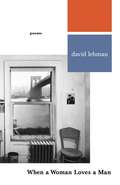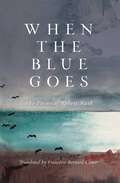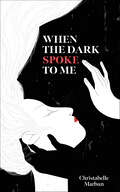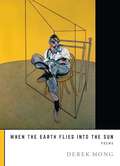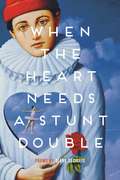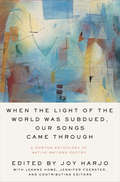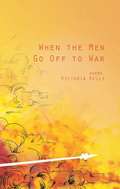- Table View
- List View
When Our Fathers Return to Us as Birds (Made in Michigan Writers Series)
by Peter MarkusOver the course of two decades and six books, Peter Markus has been making fiction out of a lexicon shaped by the words brother and fish and mud. In an essay on Markus’s work, Brian Evenson writes, "If it’s not clear by now, Markus’s use of English is quite unique. It is instead a sort of ritual speech, an almost religious invocation in which words themselves, through repetition, acquire a magic or power that revives the simpler, blunter world of childhood." Now, in his debut book of poems, When Our Fathers Return to Us as Birds, Markus tunes his eye and ear toward a new world, a world where father is the new brother, a world where the father’s slow dying and eventual death leads Markus, the son, to take a walk outside to "meet my shadow in the deepening shade." In this collection, a son is simultaneously caring for his father, losing his father, and finding his dead father in the trees and the water and the sky. He finds solace in the birds and in the river that runs between his house and his parents’ house, with its view of the shut-down steel mill on the river's other side, now in the process of being torn down. The book is steadily punctuated by this recurring sentence that the son wakes up to each day: My father is dying in a house across the river. The rhythmic and recursive nature to these poems places the reader right alongside the son as he navigates his journey of mourning. These are poems written in conversation with the poems of Jack Gilbert, Linda Gregg, Jim Harrison, Jane Kenyon, Raymond Carver, Theodore Roethke too—poets whose poems at times taught Markus how to speak. "In a dark time . . .," we often hear it said, "there are no words." But the truth is, there are always words. Sometimes our words are all we have to hold onto, to help us see through the darkened woods and muddy waters, times when the ear begins to listen, the eye begins to see, and the mouth, the body, and the heart, in chorus, begin to speak. Fans of Markus’s work and all of those who are caring for dying parents or grieving their loss will find comfort, kinship, and appreciation in this honest and beautiful collection.
When Poetry Comes: A Selection of Poems by Contemporary Bengali Women Poets in English Translation
by Marian MaddernA collection of beautiful poems.
When Poets Pray
by Marilyn McEntyreTwo dozen select prayer poems to learn from and live withPoetry and prayer are closely related. We often look to poets to give language to our deepest hopes, fears, losses—and prayers. Poets slow us down. They teach us to stop and go in before we go on. They play at the edges of mystery, holding a tension between line and sentence, between sense and reason, between the transcendent and the deeply, comfortingly familiar. When Poets Pray contains thoughtful meditations by Marilyn McEntyre on choice poems/prayers and poems about prayer. Her beautifully written reflections are contemplative exercises, not scholarly analyses, meant more as invitation than instruc¬tion. Here McEntyre shares gifts that she herself has received from poets who pray, or who reflect on prayer, believing that they have other gifts to offer readers seeking spiritual companionship along our pilgrim way. POETS DISCUSSED IN THIS BOOK Hildegard of Bingen Lucille Clifton Walter Chalmers Smith Robert Frost Wendell Berry Joy Harjo John Donne Gerard Manley Hopkins Said Marilyn McEntyre George Herbert Thomas Merton Denise Levertov Scott Cairns Mary Oliver Marin Sorescu T. S. Eliot Richard Wilbur Francisco X. Alarcon Anna Kamienska Michael Chitwood Psalm 139:1-12
When Poets Pray
by Marilyn McEntyreTwo dozen select prayer poems to learn from and live withPoetry and prayer are closely related. We often look to poets to give language to our deepest hopes, fears, losses—and prayers. Poets slow us down. They teach us to stop and go in before we go on. They play at the edges of mystery, holding a tension between line and sentence, between sense and reason, between the transcendent and the deeply, comfortingly familiar. When Poets Pray contains thoughtful meditations by Marilyn McEntyre on choice poems/prayers and poems about prayer. Her beautifully written reflections are contemplative exercises, not scholarly analyses, meant more as invitation than instruc¬tion. Here McEntyre shares gifts that she herself has received from poets who pray, or who reflect on prayer, believing that they have other gifts to offer readers seeking spiritual companionship along our pilgrim way. POETS DISCUSSED IN THIS BOOK Hildegard of Bingen Lucille Clifton Walter Chalmers Smith Robert Frost Wendell Berry Joy Harjo John Donne Gerard Manley Hopkins Said Marilyn McEntyre George Herbert Thomas Merton Denise Levertov Scott Cairns Mary Oliver Marin Sorescu T. S. Eliot Richard Wilbur Francisco X. Alarcon Anna Kamienska Michael Chitwood Psalm 139:1-12
When Rap Spoke Straight to God
by Erica DawsonA book-length poem navigating belief, black lives, the tragedies of Trump, and the boundaries of being a woman. "When Rap Spoke Straight to God is utterly transporting. In language both elevated and slangy, saucy and tender, Dawson lovingly weaves the reader around her finger.” —Jennifer Egan When Rap Spoke Straight to God isn’t sacred or profane, but a chorus joined in a single soliloquy, demanding to be heard. There’s Wu-Tang and Mary Magdelene with a foot fetish, Lil’ Kim and a self-loving Lilith. Slurs, catcalls, verses, erasures—Dawson asks readers, “Just how far is it to nigger?” Both grounded and transcendent, the book is reality and possibility. Dawson’s work has always been raw; but, When Rap Spoke Straight to God is as blunt as the answer to that earlier question: “Here.” Sometimes abrasive and often abraded, Dawson doesn’t flinch. A mix of traditional forms where sonnets mash up with sestinas morphing to heroic couplets, When Rap Spoke Straight to God insists that while you may recognize parts of the poem’s world, you can’t anticipate how it will evolve. With a literal exodus of light in the book’s final moments, When Rap Spoke Straight to God is a lament for and a celebration of blackness. It’s never depression; it’s defiance—a persistent resistance. In this book, like Wu-Tang says, the marginalized “ain’t nothing to f--- with.”
When September Comes: And Other Poems
by Peter JailallPeter Jailall continues his search for the place called home in his third volume of poetry, exploring the "open, dangerous" landscape of a post-September 11th world. In this climate of globalization, none are untouched by the threats of terrorism or the spoils of modernization and its effect on our environment. As poet, teacher and storyteller, Peter’s unique gift for the blending of language – from Caribbean-accented English to Hindi – allows him to paint beautiful dichotomies between the Guyana of his birth, and the Canada that is his current home. "To those of us in the worldwide Guyanese diaspora, Peter’s poetry is cultural regeneration and joy. It generates the anchorage of identity and self respect in a sea of uncertainty and adjustment. To our host communities it provides insights into who we are as persons. It encourages the realization that hopes, fears, and aspirations are common across cultures and all are worthy of understanding and respect. To all who read Peter’s work come challenges to thought and imagination, glowing pride, and prolonged pleasure." – Judaman Seecoomar, PhD, Author "Peter Jailall speaks poignantly to problems of identity and the painful feelings associated with movement and change in this fine new collection. He examines past and present and points to our need to find out and accept who we really are before cultural identity can be recognized."– Bob Barton, Storyteller, writer, educator (OISE, University of Toronto)
When Sun Rises (My Living World)
by Aida SalazarDerived from Mexican Indigenous wisdom, this is the third title in a series of poetic board books centering around establishing an authentic, heartfelt connection with nature.Using Mexican concepts, this poignantly lyrical series invites young children to pay witness to nature and the ways in which the outside world interacts with our own human rhythms. The Sun guides all life on Earth. We move to its cycles through the seasons—listening to the awakening of nature in spring, celebrating the shining warmth in summer, honoring our loved ones in autumn, and dreaming of better days ahead in winter. Its steadfastness touches and gives life to every being, showcasing the power of universal interconnectedness. Award-winning author Aida Salazar lovingly turns her attention to the youngest readers with her signature lyrical text—in English with a few Spanish words interwoven, perfectly paired with vibrant, mystical art crafted by Caribay M. Benavides. This book is a truly meaningful and formative experience for all young readers.
When The Teacher isn't Looking: And Other Funny School Poems (Giggle Poetry)
by Kenn Nesbitt Mike GordonA collection of humorous poems about the ups and downs of going to school.
When This World Comes to an End
by Kate CayleyKate Cayley’s is a mind both studious and curious, deeply attuned to the question “what if?” What if Nick Drake and Emily Dickinson met in the afterlife? What if a respected physician suddenly shrank to the size of a pea? What if the blind twins in a Victorian photograph could speak to us? What if we found another Earth orbiting another sun? Cayley draws on her experience as a playwright to create vividly engaging voices and characters ranging from the famous to the infamous to the all-but-anonymous. With exquisite pacing and striking imagery she draws us into the gaps in history, invites us to survey its wonders, both real and imaginary.
When Thunder Comes
by Jim Burke J. Patrick Lewis Meilo So R. Gregory Christie John Parra Tonya EngelIn moving verse, Children's Poet Laureate J. Patrick Lewis gives new voice to seventeen heroes of civil rights. Exquisitely illustrated by five extraordinary artists, this commanding collection of poems invites the reader to hear in each verse the thunder that lies in every voice, no matter how small. Featuring civil rights luminaries Coretta Scott King, Harvey Milk, Mohandas Gandhi, Nelson Mandela, Sylvia Mendez, Aung San Suu Kyi, Mamie Carthan Till, Helen Zia, Josh Gibson, Dennis James Banks, Mitsuye Endo, Ellison Onizuka, Jackie Robinson, Muhammad Yunus, James Chaney, Andrew Goodman, and Michael Schwerner.
When Water Flows (My Living World)
by Aida SalazarDerived from Mexican Indigenous wisdom, this is the second title in a series of poetic board books centering around establishing an authentic, heartfelt connection with nature.Using Mexican concepts, this poignantly lyrical series invites young children to pay witness to nature, to value it, and to become a steward of the planet. Water is essential to all life on earth—it helps us grow, it feeds us, it cleanses us, and it heals us. Its fluidity touches and gives life to every being, showcasing the power of universal interconnectedness. Acclaimed middle-grade author Aida Salazar lovingly turns her attention to the youngest readers, bringing her signature lyrical text – in English with a few Spanish words interwoven. With vibrant, mystical art, this book is a truly meaningful and formative experience for all young readers.
When We Only Have the Earth (African Poetry Book)
by Abdourahman A. WaberiIn this ode to the earth and all its living creatures, French Djiboutian poet, novelist, and essayist Abdourahman A. Waberi sounds the alarm about our imperiled planet, where &“the Sahel rises in you, in me / the Red Sea boils in you, in me / Nunvut is melting in you, in me.&” This translation by Nancy Naomi Carlson preserves the rich musicality of the original French, as well as its frequent use of wordplay and often unusual word choice. Waberi, a nomad at heart, takes us on a whirlwind tour across North America, Africa, and Europe, daring us to love the earth &“beyond all rational thought&” and to &“turn into earth, both literally and figuratively,&” as we &“turn from vanity, fears, and other pointless rustling.&” These lyrical, playful, and moving poems urge us to look for the truth and beauty hidden in our daily lives, singing of Waberi&’s own enduring love for our endangered planet and also, more forcefully, exhorting us to join him in the collective fight to save our planet from destruction.
When We Talk to God: Prayers and Poems for Black Women
by Sharifa StevensThese are prayers for your moments of gratitude and celebration. For your seasons of loss and waiting. For your days when prayers come, not in words but in groans. When We Talk to God, from poet-theologian Sharifa Stevens, captures the arc and the ache of our lives.A beautiful interweaving of artwork, prayers, and poems for Black women, this unique book encourages you to lift up your whole heart and loudest voice to God. And to tell Him about everything; nothing is off-limits. Sharifa's honest and powerful words express prayer and longing through personal experiences, biblical examples, and stunning imagery. When We Talk to God offers:An invitation to journey through honest lamentation and heartfelt joy to find greater peace in a turbulent worldPoems and prayers exploring topics from job interviews to grief, from braiding hair to feeling invisible, from parenting to dancingValidation and inspiration for Black women of faith, by a Black woman speaking from her life to yoursA relatable and authentic voice that frees you to present your own prayers and praises to the God who hears you, sees you, and loves youA beautiful gift idea for Mother's Day, Grandparents' Day, International Women's Day, spiritual anniversaries, and birthdays Ideal for Black women of any age and background, When We Talk to God is a balm to your spirit and soul as it urges you to go to God with all of who you are and with everything you can or cannot say.
When We Were Very Young (The Winnie-the-Pooh Collection)
by A. A. MilneWith a gorgeously redesigned cover and the original black and white interior illustrations by Ernest Shepard, this beautiful edition of the beloved classic poetry collection When We Were Very Young by A. A. Milne is sure to delight new and old fans alike!Before there was Winnie-the-Pooh, there was Mr. Edward Bear, a rotund teddy bear who was proud of his stature. Meet him and many other lovable characters in this verse collection that launched A. A. Milne&’s career as a children&’s author and led to the creation of his novels about Winnie-the-Pooh and Christopher Robin. Full of whimsy, humor, and imagination, these children&’s poems tell of visits to the zoo and Buckingham Palace, the romance between Little Bo Peep and Little Boy Blue, the shenanigans of peculiar characters, quiet afternoons in nature, and more.
When You Are Old: Early Poems, Plays, and Fairy Tales
by William Butler Yeats Rob DoggettRecalling Yeats's 1890s fascination in aestheticism and the arts and crafts movement, selections will draw from the first published versions of poems from works such as Crossways, The Rose, The Wind Among the Reeds, In the Seven Woods, The Green Helmet and Other Poems, Responsibilities, The Wild Swans at Coole, and Michael Robartes and the Dancer. A selection Irish myths and fairytales including "The Wanderings of Oisin," a Celtic fable and his first major poem, represent his fascination with mysticism, spiritualism and the rich and imaginative heritage of his native land.
When You Die You Will Not Be Scared to Die
by Lindsay TunklThis brief artistic collection of fears around dying--and their ultimate futility in the face of the unknown--is a keepsake, a prayer book, a prompt for contemplation, and a gift to give to others to inspire conversations about the liberating power of death and what makes a good life.This small book of 12 meditations on death is intentionally repetitive and hypnotic in effect, and will inspire the reader to list what scares them most, come to terms with their own mortality, and realize what fears are holding them back from living a life fully with 100 percent commitment. It will appeal to anyone who wishes to live with greater intention and purpose and experience more joy and appreciation of the present moment. Buddhists and mindfulness practitioners, people who are aging, people who read the news and are worried, artists, people who are taking care of others who are dying, people who are dying (i.e., all of us ...), Tarot card readers and modern-day shamans will all find inspiration in these terse lists. Young people aghast at the adult world's seeming indifference to our mortality will especially relate to the uncompromising vision of this book.
When Your Wife Has Tommy John Surgery and Other Baseball Stories: Poems
by E. Ethelbert MillerMuch-honored Washington, D.C. poet activist E. Ethelbert Miller delights and surprises us with his deft imaginings and portraits. Ethelbert&’s poems play out in baseball rhythm and express the joy of living, despite the bitter challenges in today&’s world. These poems define our time and allow us to see ourselves as human through the lens of baseball, family and music. When Your Wife Has Tommy John Surgery and Other Baseball Stories is Miller's second book of baseball poems. Here he touches new bases. There are poems about Marcel Duchamp and Ornette Coleman as well as Whitey Ford and Don Larsen. Miller's poems move the outdoor game indoors where there are moments of disappointment and despair. Baseball can be a blues game. Tommy John surgery is a way of holding onto hope. Many of these poems were written during the Covid pandemic. They beckon fans back to the ballpark. They remind us to enjoy a game that is precious and maybe even essential to our wellness. Coming after If God Invented Baseball, Miller seems to emerge from a literary dugout after a brief rain delay, ready to celebrate the American pastime again.
When a Woman Loves a Man
by David LehmanThese poems capture the romance, irony, and pathos of love; they movingly chronicle days in post-9/11 New York and bring a fresh perspective to an array of subjects -- from the Brooklyn Bridge to Gertrude Stein to Buddhism. When a Woman Loves a Man is playful, inventive, and as amusing as it is clever; it is the work of a poet at the height of his lyrical and reflective powers.
When i was in class 10th
by RuchikaRuchika, an introvert who finds solace in writing, began expressing her innermost thoughts through poetry at the age of fourteen. Her diary, once her sanctuary, now unfolds its secrets to the world in this captivating collection. A dedicated educator since 2003, Ruchika holds a Master's degree in Child Care and Education from Alagappa University and a Bachelor's in Elementary Education from JMC, Delhi. Her passion for teaching brings joy to her students, and she feels blessed to nurture young minds. With heartfelt gratitude to Shrija Publishers for bringing her youthful musings to life, Ruchika invites readers to explore the intimate realm of her poetic journey.
When the Blue Goes: The Poems of Robert Nash
by Robert NashSo little is known about the poet Robert Nash. Until the 21st century, when his poems were discovered in a French basement, he remained undiscovered. The poems had been written in Maine and sent to Nash&’s friend in France, to be discovered by the friend&’s son decades later in a suitcase.Nash emigrated to America from Sussex, England, when he was a child. He lived in Maine with his wife Catriona and son Lee, and likely didn&’t turn to writing poetry until his life took a tragic turn. Lee was killed in 1974 in Vietnam. Catriona died two years later. On May 31, 1995, one week after writing his last dated poem, Robert Nash disappeared. Anything else about Nash&’s life is speculation and hypothesis. No trace has ever been found and no family or heirs have claimed him.But the poems he left behind demonstrate a true mastery of the craft and reveal his profound solitude and his intimate and healing relationship with nature. In his introduction, former Maine Poet Laureate finds Nash&’s place in the Maine literary canon. Robert Nash has come home.Originally written in French (for his friend who didn&’t speak English) and published in France in three separate volumes, these poems have been lovingly translated back to the poet&’s native language by Françoise Canter.
When the Dark Spoke to Me
by Christabelle MarbunTeen breakout poet Christabelle Grace Marbun brings her latest collection When the Dark Spoke to Me to life through words wise beyond her years. Her uniquely positive perspective on life, death, and everything in between makes this book equally as comforting as it is compelling. Marbun&’s exceptional thoughtfulness is evident in every word she pens––her messages of hope and her effortless optimism are sure to inspire every person who touches this book.
When the Earth Flies into the Sun
by Derek MongWhen the Earth Flies into the Sun weighs digitalization and ecological disasters against the joys of domesticity. Poems speak back to mass shooters and in the voice of cloud storage. They leap from Greek ruins to intergalactic finales, Nebraskan highways to Paleolithic Hominins first learning to speak. At the book’s center are two long poems, “Midnight Arrhythmia” and “A Poem for the Scoundrel Lucian Freud,” that ground these concerns—for art, the other, and the earth—in bodies. The former, addressed to the poet’s son, is part lullaby and part letter. It tries, like a will, to quantify what we leave behind. The latter, addressed to a painter, considers Caesarian birth, ekphrasis, and the casualties of parenting, for both Freud and the poet himself.
When the Heart Needs a Stunt Double (Made in Michigan Writers Series)
by Diane DeCillisWho wouldn’t want a metaphorical stunt double to take the perilous fall that comes with the pain of loss or profound disappointment? The poems in When the Heart Needs a Stunt Double by Diane DeCillis consider resourceful ways in which we become our own stunt double and explore through a poet’s eyes the anatomy of the mind, body, and soul. Although many of these poems investigate loss and heartbreak, this book is not about being a victim. It’s about how we not only survive our most challenging moments but how we thrive in spite of them. These are poems about all of the ways our hearts both help us and betray us during major life events: dealing with divorce, the death of a loved one, separation from those closest to you, or with the agonizing experience of memory loss. The speaker appreciatively observes "how hard the muscle has worked / lifting and lowering the weight of love and sorrow." DeCillis writes that loss can feel like your heart is limping "like a wounded animal / before you sink into the shelter of your own shadow." But with every loss in these poems comes rebirth—a beautiful, sensory-rich wildflower garden of new breaths and experiences. The character of the heart is depicted as a piece of human anatomy at the same time it’s portrayed as its own world; an entire planet. DeCillis personifies the mitral, aortic, and pulmonary valves, describing our bodies as blooming with vegetation, a recursive image of living things thriving inside living things. When the Heart Needs a Stunt Double takes us on a journey of what it means to be fully human. It touches upon the gifts we find in humor, nature, art, food, and how we celebrate the beauty of our scars. These are love poems: to others, to the self, to the body. DeCillis makes it clear that wounds need attention and care, but that loss always strengthens us. This collection will be admired by poetry lovers of all kinds, and those who enjoy modern and corporeal love poems.
When the Light of the World Was Subdued, Our Songs Came Through: A Norton Anthology Of Native Nations Poetry
by Joy Harjo, LeAnne Howe, Jennifer Elise FoersterUnited States Poet Laureate Joy Harjo gathers the work of more than 160 poets, representing nearly 100 indigenous nations, into the first historically comprehensive Native poetry anthology. This landmark anthology celebrates the indigenous peoples of North America, the first poets of this country, whose literary traditions stretch back centuries. Opening with a blessing from Pulitzer Prize–winner N. Scott Momaday, the book contains powerful introductions from contributing editors who represent the five geographically organized sections. Each section begins with a poem from traditional oral literatures and closes with emerging poets, ranging from Eleazar, a seventeenth-century Native student at Harvard, to Jake Skeets, a young Diné poet born in 1991, and including renowned writers such as Luci Tapahanso, Natalie Diaz, Layli Long Soldier, and Ray Young Bear. When the Light of the World Was Subdued, Our Songs Came Through offers the extraordinary sweep of Native literature, without which no study of American poetry is complete.
When the Men Go Off to War
by Victoria KellyCollecting the nationally-recognized poems of Victoria Kelly, When the Men Go Off to War captures the hopes, anxieties, and intimacies of the military spouse during a time of war. Written over the course of her husband’s deployment in Iraq and Afghanistan, these haunting poems span vast geographical distances and generations, moving between the literal and the fanciful to find community in the midst of isolation. Kelly blends lyric and narrative elements to evoke themes of loneliness and human fragility with keen insight. But ultimately, When the Men Go Off to War is a heartrending ode to enduring romance, the reclamation of a marriage tested by loss and separation.
